Data Analyst Resume Examples

Jul 18, 2024
|
12 min read
Transform your data analyst resume: a guide to organizing your career data for maximum impact without any errors. Learn how to highlight your skills, experience, and achievements in a way that makes recruiters take note.
Rated by 348 people
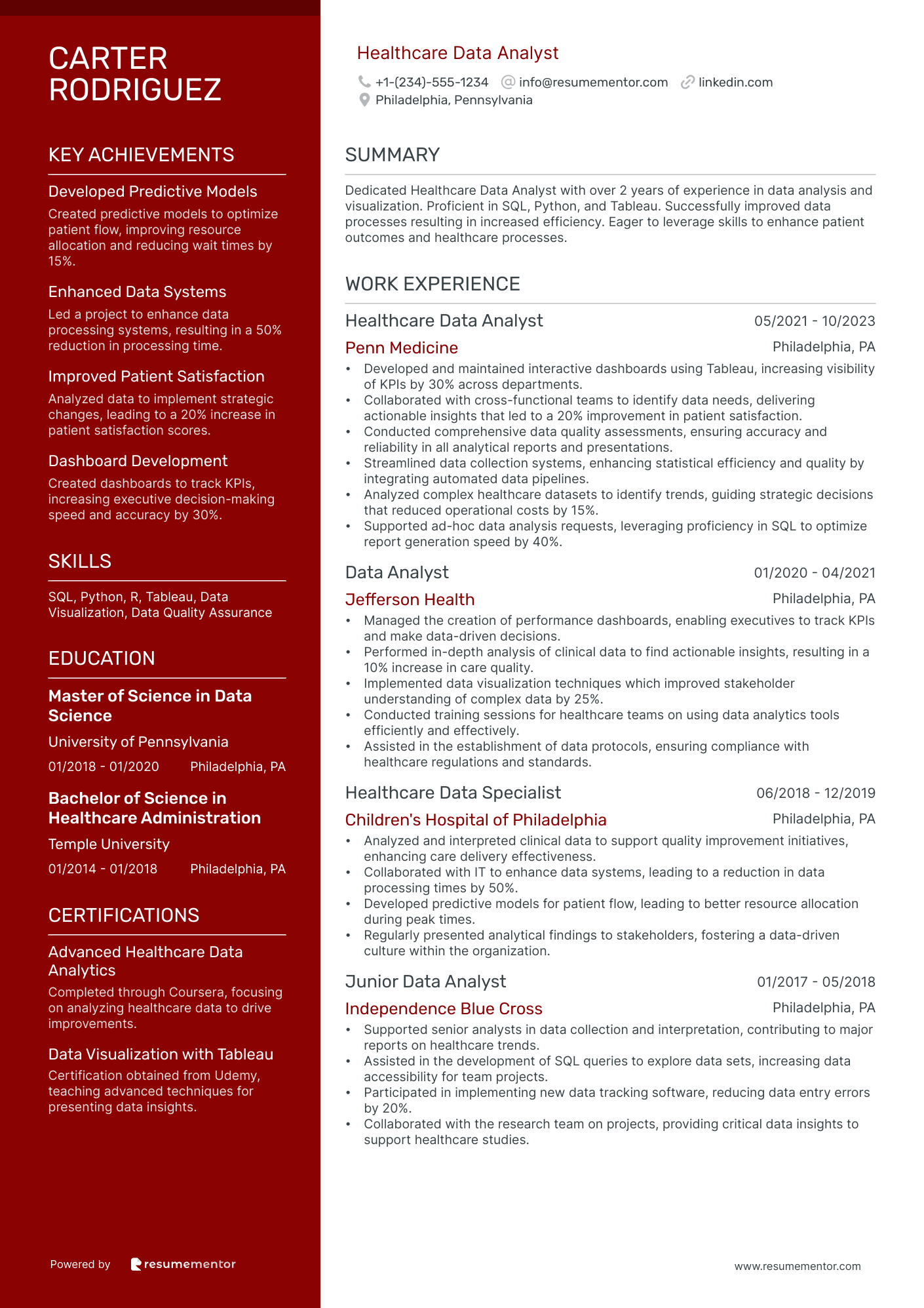
Healthcare Data Analyst
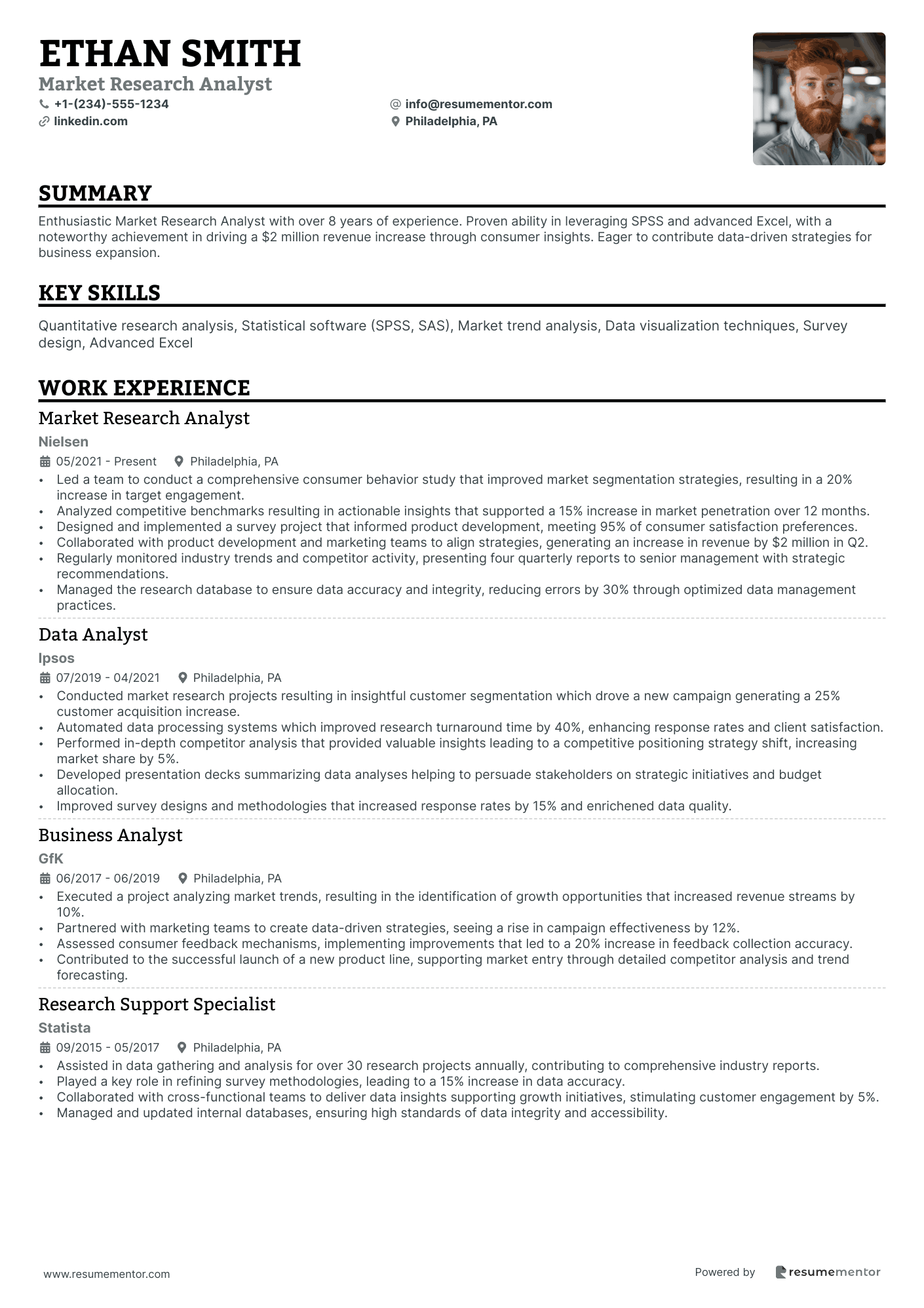
Market Research Analyst
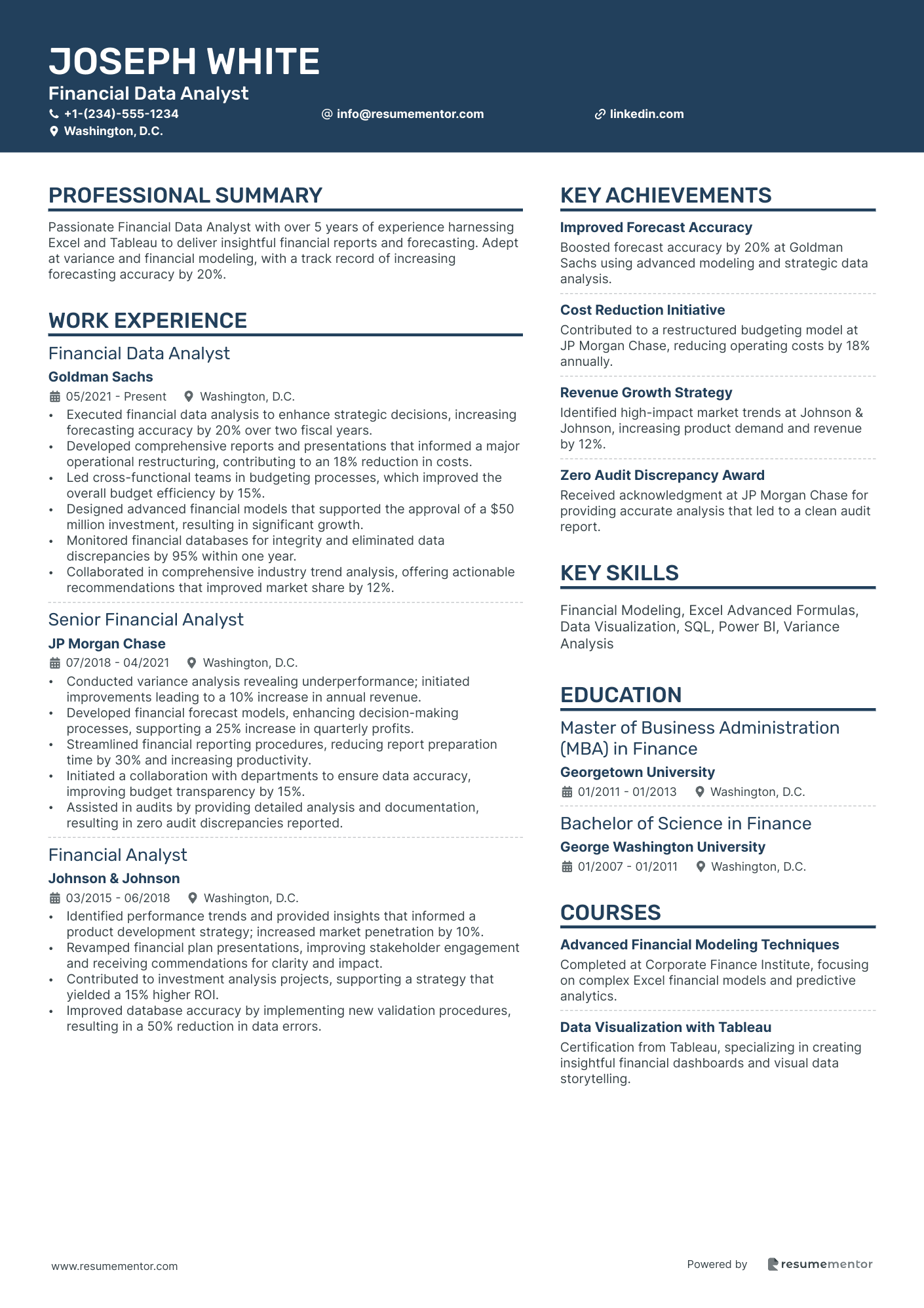
Financial Data Analyst
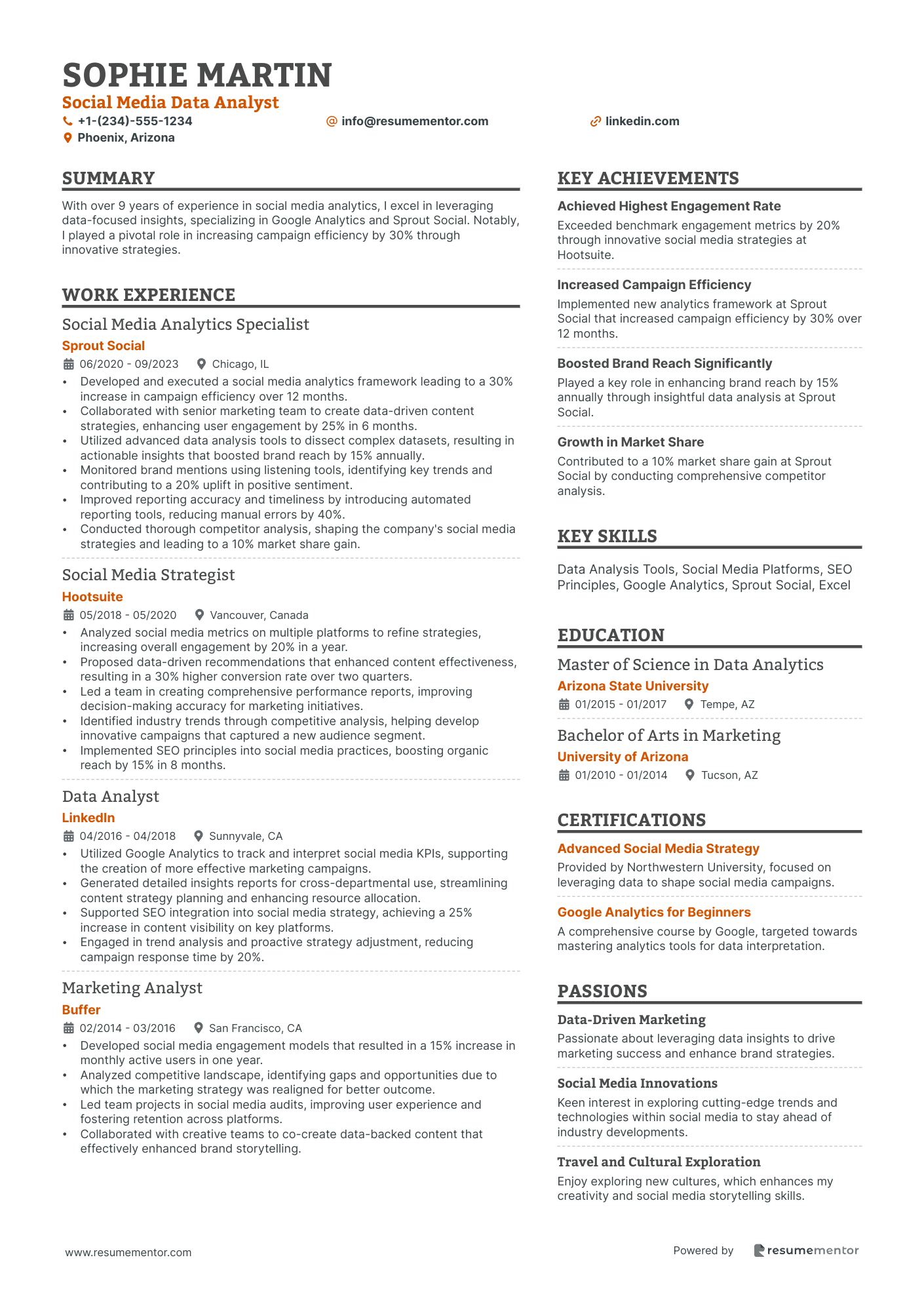
Social Media Data Analyst
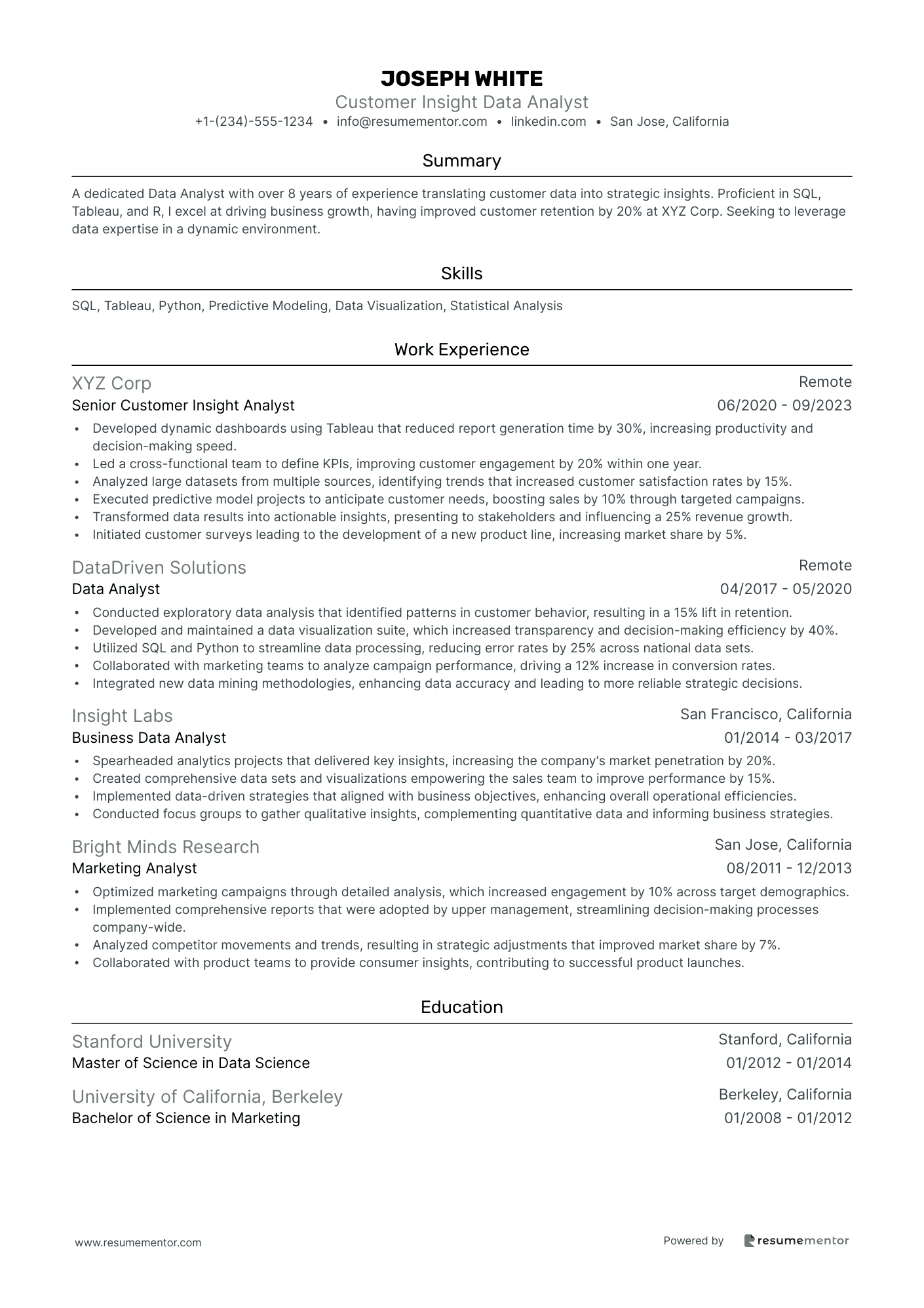
Customer Insight Data Analyst
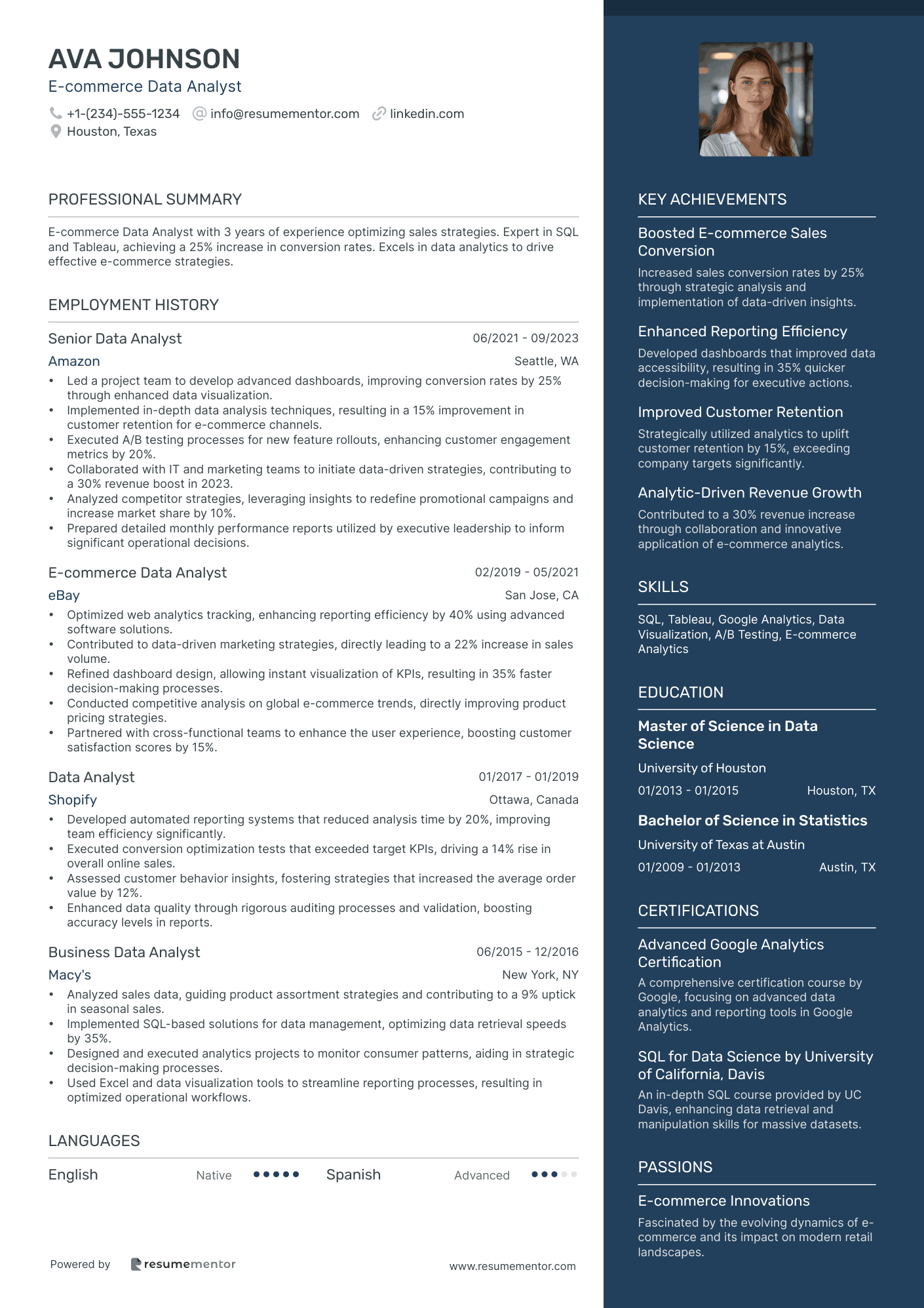
E-commerce Data Analyst
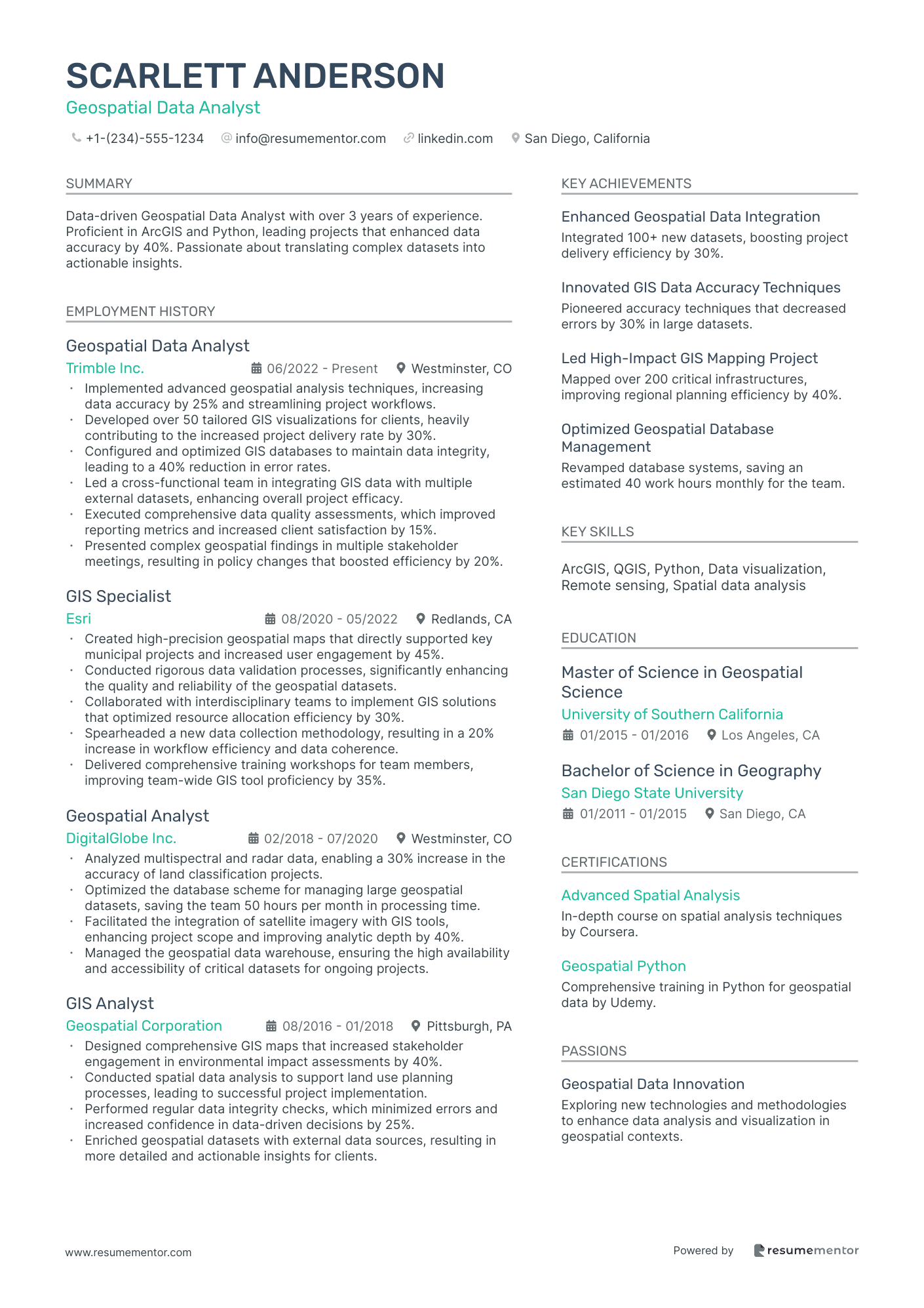
Geospatial Data Analyst
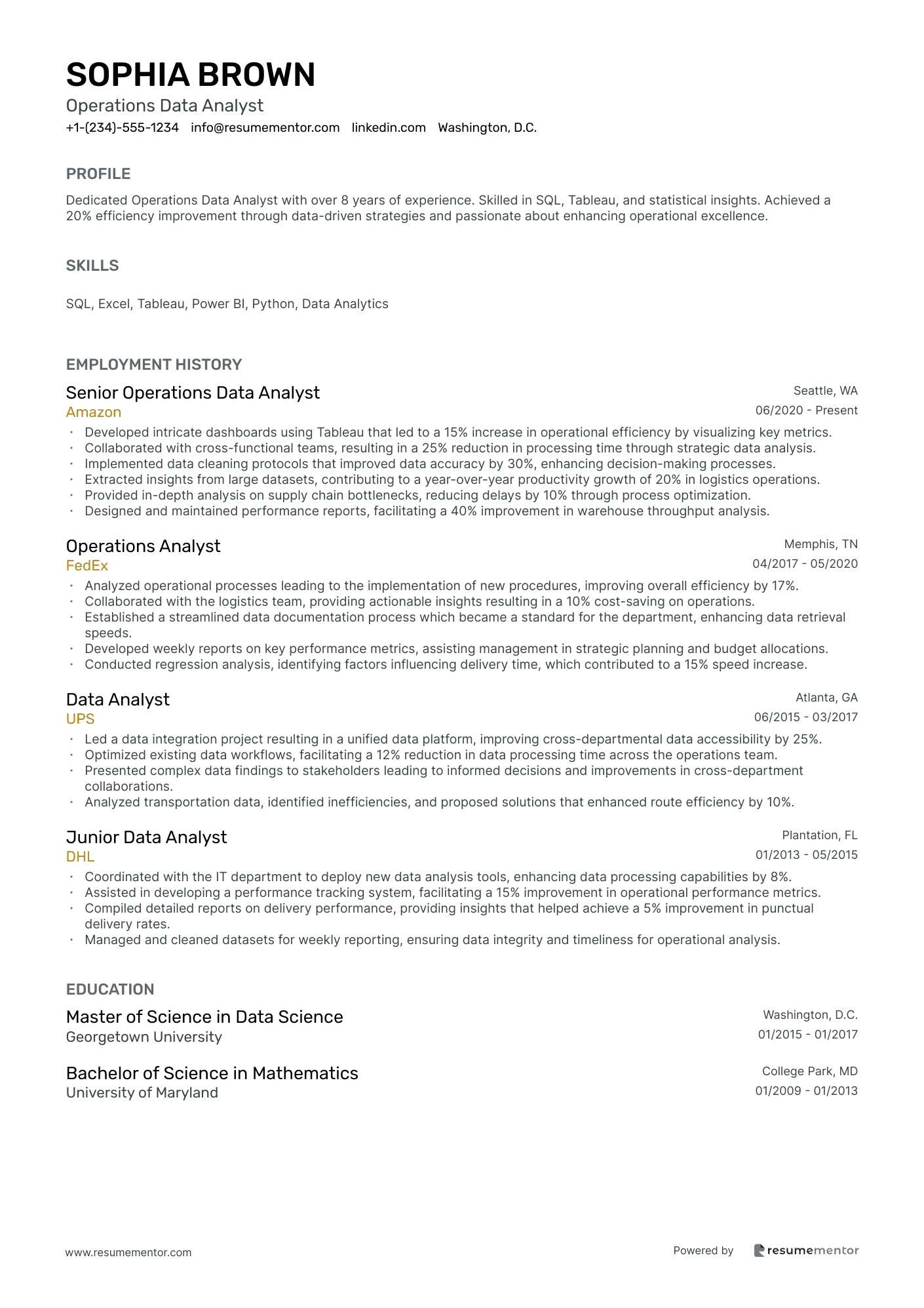
Operations Data Analyst

Healthcare Data Analyst resume sample
- •Developed and maintained interactive dashboards using Tableau, increasing visibility of KPIs by 30% across departments.
- •Collaborated with cross-functional teams to identify data needs, delivering actionable insights that led to a 20% improvement in patient satisfaction.
- •Conducted comprehensive data quality assessments, ensuring accuracy and reliability in all analytical reports and presentations.
- •Streamlined data collection systems, enhancing statistical efficiency and quality by integrating automated data pipelines.
- •Analyzed complex healthcare datasets to identify trends, guiding strategic decisions that reduced operational costs by 15%.
- •Supported ad-hoc data analysis requests, leveraging proficiency in SQL to optimize report generation speed by 40%.
- •Managed the creation of performance dashboards, enabling executives to track KPIs and make data-driven decisions.
- •Performed in-depth analysis of clinical data to find actionable insights, resulting in a 10% increase in care quality.
- •Implemented data visualization techniques which improved stakeholder understanding of complex data by 25%.
- •Conducted training sessions for healthcare teams on using data analytics tools efficiently and effectively.
- •Assisted in the establishment of data protocols, ensuring compliance with healthcare regulations and standards.
- •Analyzed and interpreted clinical data to support quality improvement initiatives, enhancing care delivery effectiveness.
- •Collaborated with IT to enhance data systems, leading to a reduction in data processing times by 50%.
- •Developed predictive models for patient flow, leading to better resource allocation during peak times.
- •Regularly presented analytical findings to stakeholders, fostering a data-driven culture within the organization.
- •Supported senior analysts in data collection and interpretation, contributing to major reports on healthcare trends.
- •Assisted in the development of SQL queries to explore data sets, increasing data accessibility for team projects.
- •Participated in implementing new data tracking software, reducing data entry errors by 20%.
- •Collaborated with the research team on projects, providing critical data insights to support healthcare studies.
Market Research Analyst resume sample
- •Led a team to conduct a comprehensive consumer behavior study that improved market segmentation strategies, resulting in a 20% increase in target engagement.
- •Analyzed competitive benchmarks resulting in actionable insights that supported a 15% increase in market penetration over 12 months.
- •Designed and implemented a survey project that informed product development, meeting 95% of consumer satisfaction preferences.
- •Collaborated with product development and marketing teams to align strategies, generating an increase in revenue by $2 million in Q2.
- •Regularly monitored industry trends and competitor activity, presenting four quarterly reports to senior management with strategic recommendations.
- •Managed the research database to ensure data accuracy and integrity, reducing errors by 30% through optimized data management practices.
- •Conducted market research projects resulting in insightful customer segmentation which drove a new campaign generating a 25% customer acquisition increase.
- •Automated data processing systems which improved research turnaround time by 40%, enhancing response rates and client satisfaction.
- •Performed in-depth competitor analysis that provided valuable insights leading to a competitive positioning strategy shift, increasing market share by 5%.
- •Developed presentation decks summarizing data analyses helping to persuade stakeholders on strategic initiatives and budget allocation.
- •Improved survey designs and methodologies that increased response rates by 15% and enrichened data quality.
- •Executed a project analyzing market trends, resulting in the identification of growth opportunities that increased revenue streams by 10%.
- •Partnered with marketing teams to create data-driven strategies, seeing a rise in campaign effectiveness by 12%.
- •Assessed consumer feedback mechanisms, implementing improvements that led to a 20% increase in feedback collection accuracy.
- •Contributed to the successful launch of a new product line, supporting market entry through detailed competitor analysis and trend forecasting.
- •Assisted in data gathering and analysis for over 30 research projects annually, contributing to comprehensive industry reports.
- •Played a key role in refining survey methodologies, leading to a 15% increase in data accuracy.
- •Collaborated with cross-functional teams to deliver data insights supporting growth initiatives, stimulating customer engagement by 5%.
- •Managed and updated internal databases, ensuring high standards of data integrity and accessibility.
Financial Data Analyst resume sample
- •Executed financial data analysis to enhance strategic decisions, increasing forecasting accuracy by 20% over two fiscal years.
- •Developed comprehensive reports and presentations that informed a major operational restructuring, contributing to an 18% reduction in costs.
- •Led cross-functional teams in budgeting processes, which improved the overall budget efficiency by 15%.
- •Designed advanced financial models that supported the approval of a $50 million investment, resulting in significant growth.
- •Monitored financial databases for integrity and eliminated data discrepancies by 95% within one year.
- •Collaborated in comprehensive industry trend analysis, offering actionable recommendations that improved market share by 12%.
- •Conducted variance analysis revealing underperformance; initiated improvements leading to a 10% increase in annual revenue.
- •Developed financial forecast models, enhancing decision-making processes, supporting a 25% increase in quarterly profits.
- •Streamlined financial reporting procedures, reducing report preparation time by 30% and increasing productivity.
- •Initiated a collaboration with departments to ensure data accuracy, improving budget transparency by 15%.
- •Assisted in audits by providing detailed analysis and documentation, resulting in zero audit discrepancies reported.
- •Identified performance trends and provided insights that informed a product development strategy; increased market penetration by 10%.
- •Revamped financial plan presentations, improving stakeholder engagement and receiving commendations for clarity and impact.
- •Contributed to investment analysis projects, supporting a strategy that yielded a 15% higher ROI.
- •Improved database accuracy by implementing new validation procedures, resulting in a 50% reduction in data errors.
- •Compiled and analyzed financial data, enhancing quarterly reports which aided strategic decision-making processes.
- •Supported budgeting and forecasting activities, contributing to a 5% reduction in departmental overspending.
- •Instrumental in revamping data entry processes, improving input efficiency by 40% and data reliability.
- •Assisted in the creation of presentation materials that augmented the understanding of financial performance for key projects.
Social Media Data Analyst resume sample
- •Developed and executed a social media analytics framework leading to a 30% increase in campaign efficiency over 12 months.
- •Collaborated with senior marketing team to create data-driven content strategies, enhancing user engagement by 25% in 6 months.
- •Utilized advanced data analysis tools to dissect complex datasets, resulting in actionable insights that boosted brand reach by 15% annually.
- •Monitored brand mentions using listening tools, identifying key trends and contributing to a 20% uplift in positive sentiment.
- •Improved reporting accuracy and timeliness by introducing automated reporting tools, reducing manual errors by 40%.
- •Conducted thorough competitor analysis, shaping the company's social media strategies and leading to a 10% market share gain.
- •Analyzed social media metrics on multiple platforms to refine strategies, increasing overall engagement by 20% in a year.
- •Proposed data-driven recommendations that enhanced content effectiveness, resulting in a 30% higher conversion rate over two quarters.
- •Led a team in creating comprehensive performance reports, improving decision-making accuracy for marketing initiatives.
- •Identified industry trends through competitive analysis, helping develop innovative campaigns that captured a new audience segment.
- •Implemented SEO principles into social media practices, boosting organic reach by 15% in 8 months.
- •Utilized Google Analytics to track and interpret social media KPIs, supporting the creation of more effective marketing campaigns.
- •Generated detailed insights reports for cross-departmental use, streamlining content strategy planning and enhancing resource allocation.
- •Supported SEO integration into social media strategy, achieving a 25% increase in content visibility on key platforms.
- •Engaged in trend analysis and proactive strategy adjustment, reducing campaign response time by 20%.
- •Developed social media engagement models that resulted in a 15% increase in monthly active users in one year.
- •Analyzed competitive landscape, identifying gaps and opportunities due to which the marketing strategy was realigned for better outcome.
- •Led team projects in social media audits, improving user experience and fostering retention across platforms.
- •Collaborated with creative teams to co-create data-backed content that effectively enhanced brand storytelling.
Customer Insight Data Analyst resume sample
- •Developed dynamic dashboards using Tableau that reduced report generation time by 30%, increasing productivity and decision-making speed.
- •Led a cross-functional team to define KPIs, improving customer engagement by 20% within one year.
- •Analyzed large datasets from multiple sources, identifying trends that increased customer satisfaction rates by 15%.
- •Executed predictive model projects to anticipate customer needs, boosting sales by 10% through targeted campaigns.
- •Transformed data results into actionable insights, presenting to stakeholders and influencing a 25% revenue growth.
- •Initiated customer surveys leading to the development of a new product line, increasing market share by 5%.
- •Conducted exploratory data analysis that identified patterns in customer behavior, resulting in a 15% lift in retention.
- •Developed and maintained a data visualization suite, which increased transparency and decision-making efficiency by 40%.
- •Utilized SQL and Python to streamline data processing, reducing error rates by 25% across national data sets.
- •Collaborated with marketing teams to analyze campaign performance, driving a 12% increase in conversion rates.
- •Integrated new data mining methodologies, enhancing data accuracy and leading to more reliable strategic decisions.
- •Spearheaded analytics projects that delivered key insights, increasing the company's market penetration by 20%.
- •Created comprehensive data sets and visualizations empowering the sales team to improve performance by 15%.
- •Implemented data-driven strategies that aligned with business objectives, enhancing overall operational efficiencies.
- •Conducted focus groups to gather qualitative insights, complementing quantitative data and informing business strategies.
- •Optimized marketing campaigns through detailed analysis, which increased engagement by 10% across target demographics.
- •Implemented comprehensive reports that were adopted by upper management, streamlining decision-making processes company-wide.
- •Analyzed competitor movements and trends, resulting in strategic adjustments that improved market share by 7%.
- •Collaborated with product teams to provide consumer insights, contributing to successful product launches.
E-commerce Data Analyst resume sample
- •Led a project team to develop advanced dashboards, improving conversion rates by 25% through enhanced data visualization.
- •Implemented in-depth data analysis techniques, resulting in a 15% improvement in customer retention for e-commerce channels.
- •Executed A/B testing processes for new feature rollouts, enhancing customer engagement metrics by 20%.
- •Collaborated with IT and marketing teams to initiate data-driven strategies, contributing to a 30% revenue boost in 2023.
- •Analyzed competitor strategies, leveraging insights to redefine promotional campaigns and increase market share by 10%.
- •Prepared detailed monthly performance reports utilized by executive leadership to inform significant operational decisions.
- •Optimized web analytics tracking, enhancing reporting efficiency by 40% using advanced software solutions.
- •Contributed to data-driven marketing strategies, directly leading to a 22% increase in sales volume.
- •Refined dashboard design, allowing instant visualization of KPIs, resulting in 35% faster decision-making processes.
- •Conducted competitive analysis on global e-commerce trends, directly improving product pricing strategies.
- •Partnered with cross-functional teams to enhance the user experience, boosting customer satisfaction scores by 15%.
- •Developed automated reporting systems that reduced analysis time by 20%, improving team efficiency significantly.
- •Executed conversion optimization tests that exceeded target KPIs, driving a 14% rise in overall online sales.
- •Assessed customer behavior insights, fostering strategies that increased the average order value by 12%.
- •Enhanced data quality through rigorous auditing processes and validation, boosting accuracy levels in reports.
- •Analyzed sales data, guiding product assortment strategies and contributing to a 9% uptick in seasonal sales.
- •Implemented SQL-based solutions for data management, optimizing data retrieval speeds by 35%.
- •Designed and executed analytics projects to monitor consumer patterns, aiding in strategic decision-making processes.
- •Used Excel and data visualization tools to streamline reporting processes, resulting in optimized operational workflows.
Geospatial Data Analyst resume sample
- •Implemented advanced geospatial analysis techniques, increasing data accuracy by 25% and streamlining project workflows.
- •Developed over 50 tailored GIS visualizations for clients, heavily contributing to the increased project delivery rate by 30%.
- •Configured and optimized GIS databases to maintain data integrity, leading to a 40% reduction in error rates.
- •Led a cross-functional team in integrating GIS data with multiple external datasets, enhancing overall project efficacy.
- •Executed comprehensive data quality assessments, which improved reporting metrics and increased client satisfaction by 15%.
- •Presented complex geospatial findings in multiple stakeholder meetings, resulting in policy changes that boosted efficiency by 20%.
- •Created high-precision geospatial maps that directly supported key municipal projects and increased user engagement by 45%.
- •Conducted rigorous data validation processes, significantly enhancing the quality and reliability of the geospatial datasets.
- •Collaborated with interdisciplinary teams to implement GIS solutions that optimized resource allocation efficiency by 30%.
- •Spearheaded a new data collection methodology, resulting in a 20% increase in workflow efficiency and data coherence.
- •Delivered comprehensive training workshops for team members, improving team-wide GIS tool proficiency by 35%.
- •Analyzed multispectral and radar data, enabling a 30% increase in the accuracy of land classification projects.
- •Optimized the database scheme for managing large geospatial datasets, saving the team 50 hours per month in processing time.
- •Facilitated the integration of satellite imagery with GIS tools, enhancing project scope and improving analytic depth by 40%.
- •Managed the geospatial data warehouse, ensuring the high availability and accessibility of critical datasets for ongoing projects.
- •Designed comprehensive GIS maps that increased stakeholder engagement in environmental impact assessments by 40%.
- •Conducted spatial data analysis to support land use planning processes, leading to successful project implementation.
- •Performed regular data integrity checks, which minimized errors and increased confidence in data-driven decisions by 25%.
- •Enriched geospatial datasets with external data sources, resulting in more detailed and actionable insights for clients.
Operations Data Analyst resume sample
- •Developed intricate dashboards using Tableau that led to a 15% increase in operational efficiency by visualizing key metrics.
- •Collaborated with cross-functional teams, resulting in a 25% reduction in processing time through strategic data analysis.
- •Implemented data cleaning protocols that improved data accuracy by 30%, enhancing decision-making processes.
- •Extracted insights from large datasets, contributing to a year-over-year productivity growth of 20% in logistics operations.
- •Provided in-depth analysis on supply chain bottlenecks, reducing delays by 10% through process optimization.
- •Designed and maintained performance reports, facilitating a 40% improvement in warehouse throughput analysis.
- •Analyzed operational processes leading to the implementation of new procedures, improving overall efficiency by 17%.
- •Collaborated with the logistics team, providing actionable insights resulting in a 10% cost-saving on operations.
- •Established a streamlined data documentation process which became a standard for the department, enhancing data retrieval speeds.
- •Developed weekly reports on key performance metrics, assisting management in strategic planning and budget allocations.
- •Conducted regression analysis, identifying factors influencing delivery time, which contributed to a 15% speed increase.
- •Led a data integration project resulting in a unified data platform, improving cross-departmental data accessibility by 25%.
- •Optimized existing data workflows, facilitating a 12% reduction in data processing time across the operations team.
- •Presented complex data findings to stakeholders leading to informed decisions and improvements in cross-department collaborations.
- •Analyzed transportation data, identified inefficiencies, and proposed solutions that enhanced route efficiency by 10%.
- •Coordinated with the IT department to deploy new data analysis tools, enhancing data processing capabilities by 8%.
- •Assisted in developing a performance tracking system, facilitating a 15% improvement in operational performance metrics.
- •Compiled detailed reports on delivery performance, providing insights that helped achieve a 5% improvement in punctual delivery rates.
- •Managed and cleaned datasets for weekly reporting, ensuring data integrity and timeliness for operational analysis.
Crafting the perfect data analyst resume is as crucial as uncovering that critical data insight. Many data analysts find it challenging to translate their technical skills and experience into a compelling, concise resume. They struggle with highlighting relevant projects, choosing the right keywords, and making their resume stand out amid the competition. The job market can be tough, with hiring managers looking for very specific skill sets and experiences. If your resume doesn't effectively showcase your abilities, you might not even get an interview. It's time to turn those data woes into resume wows!
Now, imagine your resume as a dashboard. Just like a well-designed dashboard can tell a story through data, the right resume template can tell your professional story clearly and effectively. It helps you organize your skills, experiences, and achievements in a way that's easy for hiring managers to understand.
Don't wander in the vast data jungle alone! Our site features more than 700 resume examples to help you craft the perfect resume.
Key Takeaways
- When writing a data analyst resume, it is crucial to clearly convey your skills, experience, and ability to handle data, while highlighting successful projects and proficiency in relevant tools.
- Key sections of your resume should include Contact Information, Professional Summary, Work Experience, Skills, Education, and Certifications, with possible additions like Projects and Technical Proficiencies.
- Using a reverse-chronological format with clear headings, modern fonts, and PDF saving ensures readability and effectiveness, especially for Applicant Tracking Systems.
- In the experience section, emphasize achievements and the impact of your work with specific metrics and strong action words to stand out to recruiters.
- Including a summary at the top of your resume and a thorough skills section, focusing on both hard and soft skills, helps quickly convey your value to hiring managers.
What to focus on when writing your data analyst resume
A data analyst resume should clearly convey your skills, experience, and expertise in handling data to the recruiter. The resume must highlight your ability to analyze data, provide actionable insights, and support business decisions. Demonstrating proficiency in relevant tools and your track record of successful projects is crucial.
To boost your impact, include:
- Specific metrics that showcase your achievements.
- Mention of advanced tools or software you use.
- Examples of successful projects with quantifiable outcomes.
- Certifications or courses completed related to data analysis.
Must have information on your data analyst resume
When crafting a resume for a data analyst position, it's crucial to include key sections that highlight your skills and experience in data analysis.
- Contact Information
- Professional Summary
- Work Experience
- Skills
- Education
- Certifications
You might also consider adding sections like Projects, Technical Proficiencies, and Volunteer Experience to further showcase your abilities and background. These additional sections can help set you apart from other candidates.
Which resume format to choose
For a data analyst resume, the best format is the reverse-chronological resume. This format highlights your most recent experience first, making it easy for hiring managers to see your current skills and achievements. Use modern fonts like Rubik or Montserrat for a contemporary look instead of outdated ones like Arial or Times New Roman. Always save your resume as a PDF to ensure it looks the same on all devices. Keep your margins at one inch on all sides to maintain readability and a clean look. Clearly label each section with headings like "Work Experience" and "Education" to help Applicant Tracking Systems (ATS) easily identify and categorize your information.
A data analyst resume should have the following sections:
- Contact Information
- Professional Summary
- Skills
- Work Experience
- Education
- Certifications
- Projects
- Tools & Technologies
Resume Mentor's free resume builder handles all of this for you, making it easy to create a polished and professional resume.
How to write a quantifiable resume experience section
Writing your resume's experience section, especially for a data analyst role, can be a little tricky, but with the right approach, it can shine. Start with your most recent job and go backward in time. Aim to cover the last 10-15 years of your career, focusing on roles most relevant to data analysis. Highlight job titles that directly link to data or analytics to make your expertise clear.
Tailor your resume to fit the job you're applying for. This means emphasizing experiences that match the job description. Use strong action words to make your bullet points stand out. Words like "achieved," "improved," "analyzed," and "implemented" are powerful.
Avoid just listing responsibilities. Instead, focus on what you achieved in each role. Include numbers to show the impact you had. For example, "Increased report accuracy by 20%," is more impressive than saying, "Created reports."
Here is an example of a poorly written experience section:
- •Developed reports
- •Analyzed data
- •Used SQL
- •Assisted in data collection
- •Cleaned data
- •Worked with senior analysts
In this example, the information is too generic, and it won't stand out to recruiters. It only lists tasks without showing the impact or results of the work.
Now, here's an example that is well-written:
- •Increased data processing efficiency by 30% using advanced SQL techniques
- •Led a team of 5 analysts on a project that resulted in a cost savings of $1.2M annually
- •Developed and implemented predictive models that improved sales forecasting accuracy by 15%
- •Developed 10+ dashboards for real-time performance tracking, reducing report generation time by 25%
- •Automated data cleaning processes, resulting in a 40% reduction in errors
- •Collaborated with the marketing team to analyze customer data, boosting campaign ROI by 20%
This example is effective because it shows specific achievements with numbers to back them up. It highlights the candidate's impact on the organization, making the experience section far more compelling.
Data analyst resume experience examples
Looks like you're ready to data-mine some serious resume gold! Let's get cracking with these sparkling experiences that will make your resume shine brighter than an Excel spreadsheet on a Monday morning.
Achievement-focused
Highlight your top accomplishments to show impact and value.
Data Analyst
TechCorp Inc.
2019 - 2022
- Increased data accuracy by 20% through implementation of rigorous validation processes.
- Led the analysis for a marketing campaign that boosted sales by 15%.
- Received ‘Employee of the Year’ award for outstanding data analysis and insights.
Skills-focused
Convey your technical prowess and data skills.
Data Analyst
DataWorks
2021 - Present
- Proficient in SQL, Python, and R for data analysis.
- Expert in data visualization tools like Tableau and Power BI.
- Strong skills in predictive analytics and statistical modeling.
Responsibility-focused
Showcase your responsibilities to display reliability and dependability.
Data Analyst
MarketData Inc.
2018 - 2021
- Managed data integrity for a database of over 1 million entries.
- Developed automated reports for key stakeholders.
- Facilitated monthly data insight meetings to inform business decisions.
Project-focused
Detail key projects you've headed to underline your hands-on experience.
Data Analyst
Retail Insights
2020 - 2022
- Led a cross-functional team to develop a customer segmentation model.
- Revamped the company’s data architecture, reducing query time by 50%.
- Implemented a predictive analytics dashboard for sales forecasting.
Result-focused
Emphasize the tangible results of your efforts and contributions.
Data Analyst
Finance Solutions
2016 - 2019
- Optimized data processing pipelines, reducing labor costs by 10%.
- Enhanced customer retention rate by 8% through targeted data analysis.
- Increased reporting accuracy, leading to a 12% increase in overall efficiency.
Industry-Specific Focus
Describe your experience tailored to a specific industry to show domain expertise.
Healthcare Data Analyst
MedData Solutions
2019 - Present
- Analyzed patient data to optimize hospital resource allocation.
- Developed algorithms to predict patient admission rates.
- Collaborated with medical teams to improve data-driven decision making.
Problem-Solving Focused
Describe challenges faced and how you resolved them to show your analytical and problem-solving skills.
Data Analyst
Analytics Pro
2018 - 2021
- Identified root causes of data discrepancies, ensuring data integrity.
- Resolved system integration issues, improving data workflow efficiency.
- Developed solutions for automating data cleaning processes.
Innovation-focused
Showcase your innovative thinking and contributions to new methods, processes, or technologies.
Data Analyst
Innovate Data
2017 - 2022
- Introduced new machine learning models for predictive analysis.
- Developed dynamic dashboards that revolutionized business reporting.
- Implemented a new data capture process, increasing data accuracy.
Leadership-focused
Illustrate your leadership qualities and experience in guiding teams towards success.
Senior Data Analyst
DataLead Inc.
2020 - Present
- Led a team of 5 data analysts in delivering high-quality reports.
- Mentored junior analysts, improving team skill levels.
- Coordinated with management to align data projects with business goals.
Customer-focused
Demonstrate how you've used data analysis to improve customer satisfaction and experience.
Customer Data Analyst
CustomerFirst Solutions
2019 - 2023
- Analyzed customer feedback data to enhance product features.
- Developed customer segmentation strategies to target marketing efforts.
- Improved customer satisfaction by 10% through data-driven insights.
Growth-focused
Highlight your contributions to the growth and expansion of the company or team.
Data Analyst
GrowthTech
2016 - 2020
- Identified market trends that led to a 15% increase in revenue.
- Generated insights that contributed to the expansion into new markets.
- Developed growth models to forecast future business opportunities.
Efficiency-focused
Showcase how you've improved processes and increased efficiency through your work.
Data Analyst
Efficiency Experts
2018 - 2021
- Streamlined data processes, reducing analysis time by 30%.
- Automated routine data tasks, saving 20 hours per month.
- Improved data reporting accuracy, enhancing decision-making speed.
Technology-focused
Emphasize your work with modern technologies and how they helped in data analysis tasks.
Data Analyst
TechSavvy Solutions
2021 - Present
- Utilized cloud platforms like AWS and Azure for data storage and processing.
- Incorporated AI tools to improve data-driven insights.
- Maintained and optimized big data solutions using Hadoop and Spark.
Collaboration-focused
Highlight your experience working with teams and across departments for achieving common goals.
Data Analyst
CollabData Inc.
2019 - 2022
- Collaborated with marketing team to enhance campaign strategies using data.
- Worked with IT department to improve data security protocols.
- Partnered with product team to develop data-driven feature updates.
Training and Development focused
Showcase your experience in training and developing other team members to enhance overall skill levels.
Lead Data Analyst
DataMentors Corp.
2017 - 2021
- Conducted workshops on data analysis techniques and tools.
- Created training materials for onboarding new data analysts.
- Mentored junior analysts, helping them improve their data analysis skills.
Write your data analyst resume summary section
Writing a resume summary for a data analyst requires a concise description of your skills, experiences, and career goals. You should aim to convey your value quickly, as hiring managers often skim through resumes. Remember, this section sits at the top of your resume and sets the tone for the rest of your document.
Self-descriptions in a resume summary should focus on highlighting your key skills and notable achievements. Use strong action verbs and keep each sentence clear and relevant. Avoid jargon and fluff. Be specific about your experience level, key skills, and notable accomplishments that align with the job you are applying for.
A resume summary differs from a resume objective and a summary of qualifications. A resume summary highlights your key skills and experiences, while a resume objective outlines what you want to achieve in the role. A resume profile is a more detailed version of a summary and can include some personal traits. A summary of qualifications is a bullet-point list of key qualifications relevant to the job.
The first summary example lacks focus and specificity. It uses generic phrases like "worked in big companies and small companies" and "did many different things," which do not provide any concrete information. It also fails to highlight specific skills or achievements, making it less impactful. Hiring managers might find this vague and unconvincing.
The second example is clear, focused, and specific. It mentions key skills like SQL, Python, and Tableau, providing a strong sense of the candidate's technical abilities. The summary also highlights a concrete achievement, increasing company revenue by 20%, which provides measurable proof of value. This makes the candidate seem capable and results-oriented.
Listing your data analyst skills on your resume
Creating a skills section for your data analyst resume can be crucial for showcasing your qualifications. This section can either stand alone or be incorporated into your experience and summary sections. Highlighting your strengths and soft skills is also important, as these are often valued by employers just as much as technical capabilities.
Hard skills are specific, teachable abilities such as proficiency in software or analytics tools. When integrated effectively, your skills and strengths can double as resume keywords that ATS (Applicant Tracking Systems) scan for matching job descriptions.
Here’s an example of a standalone skills section:
This skills section is efficient because it lists a variety of relevant technical skills that a data analyst should possess. It includes popular tools and software like SQL, Python, and Tableau, which are essential for data analysis. The section is concise and easy to read, making it clear to hiring managers and ATS systems what skills you possess.
Best hard skills to feature on your data analyst resume
Hard skills are essential technical abilities that a data analyst must have. They should communicate your proficiency in tools, methodologies, and techniques that are crucial for data analysis.
Hard Skills
- SQL
- Python
- R
- Tableau
- Excel
- Power BI
- Data Mining
- Statistical Analysis
- Data Cleaning
- Data Warehousing
- Machine Learning
- Big Data Analytics
- Data Visualization
- Database Management
- ETL (Extract, Transform, Load) Processes
Best soft skills to feature on your data analyst resume
Soft skills are personal attributes that enable you to interact effectively and harmoniously with others. For a data analyst, these skills should communicate your ability to think critically, solve problems, and work well in teams.
Soft Skills
- Critical Thinking
- Problem-Solving
- Attention to Detail
- Communication
- Time Management
- Teamwork
- Adaptability
- Creativity
- Analytical Thinking
- Organization
- Decision-Making
- Interpersonal Skills
- Patience
- Leadership
- Emotional Intelligence
How to include your education on your resume
The education section of your data analyst resume is a critical component. It showcases your academic background and can often be a deciding factor for recruiters. Tailor your education section specifically to the job you are applying for; avoid including irrelevant educational experiences.
When including your GPA on your resume, it can be a highlight if it's strong, typically above 3.5. Also, if you graduated with honors such as cum laude, mention it explicitly as it stands out positively.
For listing a degree, include the full name of the degree, the name of the institution, its location, and your dates of attendance.
Here's an example of a poorly written education section:
This example is bad because it lacks specific degree relevance for a data analyst position. It does not mention a GPA or honors, which can be crucial. Additionally, it doesn't specify the field of study, leaving it too vague.
Here’s an outstanding data analyst resume education section example:
This example is good because it directly highlights a degree in Data Science, which is perfectly relevant for a data analyst role. Including "cum laude" and a high GPA of 3.8 showcases academic excellence. The details are clear and precise, leaving a positive impact on the recruiter.
How to include data analyst certificates on your resume
Including a certificates section is essential for a data analyst resume. Certificates show that you have formal training and confirm your qualifications. You can also feature key certificates in the header of your resume to draw immediate attention.
List the name of the certificate clearly. Include the date you obtained it. Add the issuing organization. Make sure the certificates are relevant to the data analyst position.
For example, a good certificates section might look like this JSON format:
This example is strong because it shows recognized and relevant certifications from reputable organizations. These credentials are directly related to data analytics and would instantly grab the employer's attention, showing you have the required skills for the job.
Extra sections to include in your data analyst resume
In today's job market, crafting a well-rounded and engaging resume is crucial, especially for a data analyst role. While technical skills and experience are essential, additional sections can set you apart from the competition and give potential employers a fuller picture of who you are.
- Language section — List languages you speak fluently to highlight your communication skills and potential to work in diverse teams.
- Hobbies and interests section — Share relevant hobbies to give employers insight into your personality and potential cultural fit.
- Volunteer work section — Include volunteer experiences to show your dedication to community engagement and your ability to work selflessly towards team goals.
- Books section — Mention books you've read related to data analysis or professional growth to demonstrate your commitment to continuous learning.
By incorporating these sections, your resume will not only showcase your expertise as a data analyst but also present a comprehensive view of your abilities and interests. Each section adds a distinct layer to your profile, making your resume more robust and engaging for hiring managers.
Pair your data analyst resume with a cover letter
A cover letter is a document that accompanies your resume when applying for a job. It provides a brief introduction, highlights key achievements, and explains why you are the best fit for the position. A well-crafted cover letter can grab the employer's attention, making your application stand out.
For a data analyst, your cover letter should focus on your ability to interpret complex data, your technical skills with tools like Excel and SQL, and any experience you have with data visualization software. You should also highlight your problem-solving skills and attention to detail, as well as any relevant projects or achievements from your previous roles or studies.
Use Resume Mentor's cover letter builder to make this process easy and stress-free. The builder ensures your cover letter is formatted correctly, and exporting as a PDF protects your content and formatting. Start creating your standout cover letter today!
Paisley Moore
Indianapolis, Indiana
+1-(234)-555-1234
help@resumementor.com
Related Articles

Continue Reading
Check more recommended readings to get the job of your dreams.
Resume
Resources
Tools
© 2026. All rights reserved.
Made with love by people who care.

